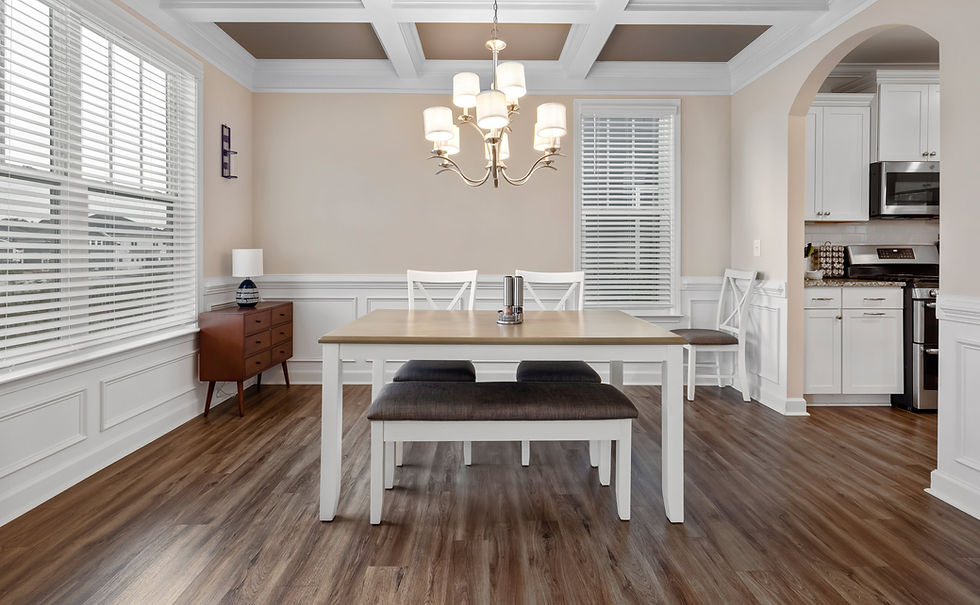What Causes Scratches on Hardwood Floors?
- alex87032
- May 24, 2024
- 3 min read
Updated: Jun 3, 2024
Hardwood floors are a timeless classic, adding warmth and sophistication to any space. However, they are vulnerable to scratches, which can detract from their beauty. This guide will equip you with the knowledge to combat scratches, prevent future scuffs, and restore your floor to its former glory.

Three Types of Hardwood Floor Scratches
Scratches come in a variety of depths, each requiring a different approach for eradication. Here's a breakdown of the three most common scratch culprits:
Type of Scratch | Description | Depth |
The Sneaky Surface Scratch | Minor blemishes residing solely within the polyurethane finish. | 2-3 millimeters |
The Mild Menace | Minor scratches that penetrate both the finish and slightly mar the wood. | Slightly deeper than the finish |
The Deep Destroyer | Deep gashes gouging the wood significantly, often caused by heavy objects or improper furniture movement. | Significant wood depth |
Did you know? The hardness of your wood plays a role in scratch resistance. According to the Janka hardness test, a common measure for wood durability, Brazilian cherry (2,350 lbf) is significantly harder than pine (1,200 lbf), making it more resistant to scratches.
Keeping Scratches on Hardwood Floors at Bay
An ounce of prevention is truly worth a pound of cure, especially when it comes to hardwood floors. Here are some proactive measures to minimize scratches:
Type of Scratch | Common Causes | Prevention Tips |
Light Scratches | Shoes, pets, dirt | Remove shoes indoors, trim pet nails, and avoid abrasive brooms or vacuum implements when cleaning. |
Minor Scratches | Shoes (stilettos, cleats), furniture | Keep shoes off hardwood, use furniture pads, and move furniture properly. |
Deep Scratches | Moving heavy furniture improperly, dropping heavy objects | Move heavy objects carefully and use proper techniques. |
General Prevention Tips
Shoe Ban: Ensure that family and guests don’t walk on floors while wearing shoes.
Paw Patrol: Keep pet traffic to a minimum and ensure no pets are running over your hardwood.
Abrasion and Dirt: Regular sweeping and mopping with a microfiber mop remove dirt and debris before they can inflict scratches.
The Art of Hardwood Scratch Repair
Now, let's address those pesky scratches that have already marred your floor. The repair method depends on the severity of the scratch:
1. Buffing Out the Superficial
For light scratches, buffing with a professional-grade polishing compound can often minimize their appearance. Apply the compound with a soft cloth, following the manufacturer's instructions for optimal results.
2. Refinishing for Renewal
Minor scratches can be addressed through hardwood floor refinishing. This process involves stripping off the existing finish and a thin layer of wood (usually 1-2 millimeters), followed by restaining and refinishing. This method is effective but should be used judiciously as it can only be done a limited number of times (typically 10-12 times over the floor’s lifespan).
3. Wood Putty to the Rescue
For deep scratches, wood putty offers a solution. Apply the putty according to the manufacturer's instructions, ensuring you choose a color that closely matches your floor. Once dry, sand the putty flush with the surrounding wood.
Pro Tip: When dealing with scratches, always test any repair product on an inconspicuous area of your floor first to ensure it achieves the desired outcome.
Beyond Scratches: Additional Threats
While scratches are a common concern, other threats can damage your hardwood floors. Here are two to be aware of:
— Moisture Mischief
Water is the enemy of hardwood floors. Spills and leaks can cause warping and buckling. Promptly address any moisture issues to prevent lasting damage.
— Sun's Fury
Direct sunlight can fade hardwood floors over time. Strategically placed window treatments can help mitigate sun damage.

Additional Tips for Maintaining Hardwood Floors
Regular Cleaning Routine: Develop a regular cleaning routine, involving sweeping daily, mopping weekly with a wood floor cleaner, and a deeper clean every few months.
The Right Cleaning Tools: Avoid abrasive cleaners, sponges, or harsh chemicals. Opt for a microfiber mop and a wood floor cleaner specifically designed for your type of hardwood.
Maintaining Proper Humidity: Maintain a humidity level between 30% and 50% in your home to prevent cracks and warping. Invest in a hygrometer to monitor humidity levels and consider a humidifier if needed.
Refine Wisely: Refinishing should be done judiciously. Plan on refinishing only 10-12 times throughout the lifespan of your floor.
Professional Help: For deep scratches or extensive floor damage, seek professional help. Experienced floor refinishers can assess the damage and recommend the best course of action.
Conclusion
With proper care and maintenance, your hardwood floors can grace your home for generations. By understanding the different types of scratches, implementing preventative measures, and employing the appropriate repair techniques, you can keep your floors looking their best. Remember, even if scratches appear, they don't have to be a permanent eyesore. With a little effort, you can restore your hardwood floors to their original grandeur. Now, go forth and conquer those pesky scratches!




Comments